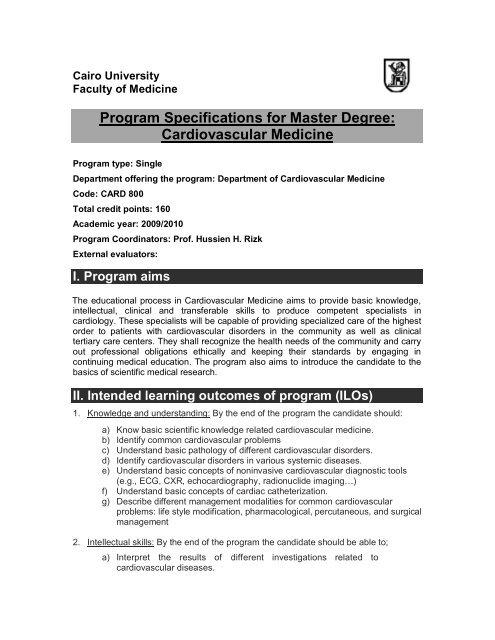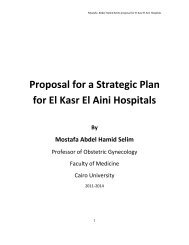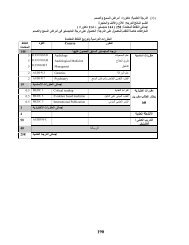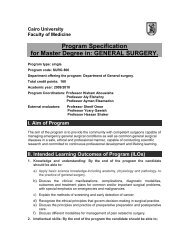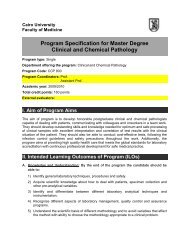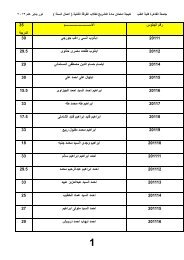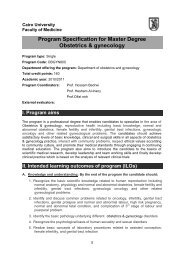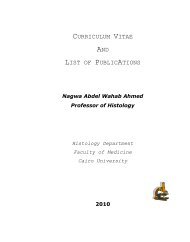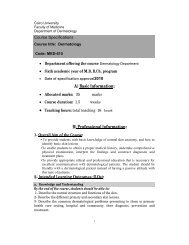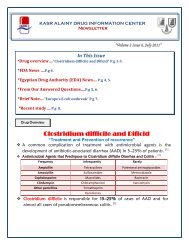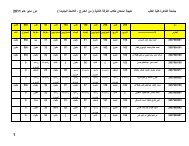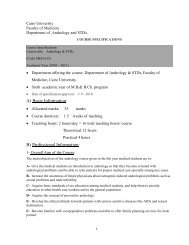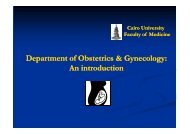Cardiovascular Medicine (CARD 800)
Cardiovascular Medicine (CARD 800)
Cardiovascular Medicine (CARD 800)
- No tags were found...
Create successful ePaper yourself
Turn your PDF publications into a flip-book with our unique Google optimized e-Paper software.
Cairo UniversityFaculty of <strong>Medicine</strong>Program Specifications for Master Degree:<strong>Cardiovascular</strong> <strong>Medicine</strong>Program type: SingleDepartment offering the program: Department of <strong>Cardiovascular</strong> <strong>Medicine</strong>Code: <strong>CARD</strong> <strong>800</strong>Total credit points: 160Academic year: 2009/2010Program Coordinators: Prof. Hussien H. RizkExternal evaluators:I. Program aimsThe educational process in <strong>Cardiovascular</strong> <strong>Medicine</strong> aims to provide basic knowledge,intellectual, clinical and transferable skills to produce competent specialists incardiology. These specialists will be capable of providing specialized care of the highestorder to patients with cardiovascular disorders in the community as well as clinicaltertiary care centers. They shall recognize the health needs of the community and carryout professional obligations ethically and keeping their standards by engaging incontinuing medical education. The program also aims to introduce the candidate to thebasics of scientific medical research.II. Intended learning outcomes of program (ILOs)1. Knowledge and understanding: By the end of the program the candidate should:a) Know basic scientific knowledge related cardiovascular medicine.b) Identify common cardiovascular problemsc) Understand basic pathology of different cardiovascular disorders.d) Identify cardiovascular disorders in various systemic diseases.e) Understand basic concepts of noninvasive cardiovascular diagnostic tools(e.g., ECG, CXR, echocardiography, radionuclide imaging…)f) Understand basic concepts of cardiac catheterization.g) Describe different management modalities for common cardiovascularproblems: life style modification, pharmacological, percutaneous, and surgicalmanagement2. Intellectual skills: By the end of the program the candidate should be able to;a) Interpret the results of different investigations related tocardiovascular diseases.
Table 1: First partCourses Course modules CreditpointsCompulsory coursesTable 2: Second parttotalPhysiology · <strong>Cardiovascular</strong> system 1.5 1. a, b· Renal and ElectrolyteBiochemistry · General principles0.5 1. a, b· Carbohydrate & diabetesmetabolism· Lipid metabolismPathology · <strong>Cardiovascular</strong> system 4 1. cPharmacologyInternal<strong>Medicine</strong>· General pharmacology· <strong>Cardiovascular</strong> drugs· General principles· Renal and endocrine· Respiratory· NeurologyElective Courses Candidate choose 2 courses:· Critical Reading· Scientific writing· EBM· Medical ethics· Medical statistics II· Hospital administrationScientific activitiesILOs4 1.a 2.c4 3. a,b0.50.50.50.50.50.5Residency training program (phase 1 basic training)12434.a,b,c,d,e,f3.c,d,e,f1.a,b,c,d,e,f,g3.g,hitemCreditpointsILOs.1- Clinical cardiovascular medicine2- Core procedures1061.a,b3.a,bScientific activities 4 3.c,d,e,fMaster thesis 20 4.d,e,fResidency training program (phase 2)1.a,b,c,d,e,f,g3.g,h
Residency Training Program· First phase (Basic Training):According the Faculty of <strong>Medicine</strong>, Cairo University Bylaws for Post GraduatePrograms (July 2009), all the students should have a basic training in generalmedicine for 18 months. During this period the students attend the basic sciencescourses as well as the general surgery course. They also should complete theelective courses· Second phase (Special Training):· All students should complete the basic special part of the resident training programin the cardiology department in order to acquire the needed credit points. This isachievable via attending: outpatient clinics, inpatient ward, cardiology critical careunit, the noninvasive cardiovascular Lab. as well as the cardiac catheterization lab.· Experiential learning opportunities:1. Every patient seen, on the ward or in out-patients, provides a learning opportunity,which will be enhanced by following the patient through the course of their illness.Patients seen should provide the basis for critical reading around clinical problems.2. Every time a trainee observes another doctor, senior staff or fellow trainee, seeinga patient or their relatives there is an opportunity for learning.3. Ward-based learning including ward rounds. Ward rounds, including those posttake,should be led by a senior staff and include feed-back on clinical and decisionmaking skills.4. Supervised consultations in outpatient clinics. Trainees should have theopportunity to assess both new and follow-up patients and discuss each case withthe supervisor so as to allow feedback on diagnostic skills and gain the ability to planinvestigations.5. Trainees need to learn to make increasingly independent decisions on diagnosis,investigations and treatment consistent with their level of experience andcompetence and with maintaining patient safety. These decisions should bereviewed with their supervising senior staff.6. There are many situations where clinical problems are discussed with clinicians inother disciplines, such as cardiac surgical multidisciplinary meetings. These provideexcellent opportunities for observation of clinical reasoning.NB: The details of the training program are provided in separate document. Thethird phase of residency training (advanced training) is part of the MD degreeMaster ThesisAll master-degree students should prepare a thesis in an area of active research that isclosely linked to cardiovascular medicine. The department and the ethical committeesmust approve the protocol of the research. The thesis (should / may) include a reviewpart and a research part. The thesis is supervised by one or more senior staff membersand may include other specialties according to the nature of the research. The thesisshould be evaluated and approved by a committee of three professors including one ofthe supervisors and an external professor.
Scientific Activities:The students should participate in the following scientific activities of the department:o Staff round: 3 rounds every weeko The Department Conference: once weeklyo Journal club (presenting scientific articles): once weeklyo Mortality and morbidity conference: once weeklyo Congenital club: once weeklyo Postgraduate seminars: once weeklyo Echocardiography revision session: once weekly.o ECG and EP reading session: once weeklyo Cardiac catheterization revision session: once weeklyo Scientific meetings arranged by the Department.o Scientific meetings arranged by other departments or Universities.o Attendance of discussion of thesis.· Clinical Cardiology Grand Rounds provides a forum for Cardiology faculty members,as well as invited guest speakers, to provide updates and reviews of major topics incardiology. All presentations are clinically oriented and start with a case presentation.Attendance is required for all fellows.· Echo conference covers the full range of cardiology topics as applied toechocardiography. This is accomplished via didactic presentations given by the echofaculty and by the interactive review of echocardiograms. Emphasis is placed on echointerpretation, understanding Doppler techniques and Doppler hemodynamics,limitations of echo, and quality assurance. Transoesophageal and stress echotechniques and potential complications are also discussed. Attendance is required forall non-invasive fellows.· EP Conference is conducted by the EP faculty and covers all areas of cardiacelectrophysiology. Emphasis is placed on intracardiac electrocardiograms, pacemakertroubleshooting, and device interrogation/management. Attendance is required for allfellows.· ECG Conference is a weekly conference that focuses on preparation for the ECGportion of the cardiology boards. Several ECGs are reviewed in an interactive forumeach session. Attendance is required for all fellows.· Cath Conference is designed to allow instruction in the techniques of cardiaccatheterization and angiography and to provide a forum to discuss clinicalmanagement issues related to patients referred for cardiac catheterization. Cath Labquality assurance will also be addressed. The Cardiothoracic Surgery members areinvited to attend the conference and greatly enhance the discussion by expandingupon surgical issues and offering opinions from the surgical standpoint. Attendance isrequired for all cath fellows.· Journal Club is held every week. It provides a forum for residents and facultymembers to interact in a less formal setting. The main goal of journal club is to helpfellows learn to critically assess the literature and to facilitate the practice of evidencebasedmedicine. The articles reviewed usually cover emerging or controversial topicsin cardiology. All candidates are expected to attend.Each activity will be monitored and given credit points registered in a Resident logbook.The student should collect the required points before being allowed to sit for final examV. Regulations for progression and program completion
After collecting the required credit points for the respective courses, the first phase ofthe residency training, and the scientific activities, the student will be eligible to sit for thefirst part examination. In case the student fails to pass the examination, he/she mayproceed in the clinical training and can resubmit for the next examination. After passingthe first part, the student submits a protocol for Master Thesis at the beginning of thesecond part. Before submitting to the final examination he/she should finish the thesisand get approval, complete phase 2 of special training program, and collect the requiredcredit points. The candidate will receive his/her degree after passing this finalexamination. Master degree should be obtained within a maximum of 6 years afterregistration date.VI. EvaluationSupervision & Monitoring of the Training Program:According the Faculty of <strong>Medicine</strong>, Cairo University Bylaws for Residency TrainingPrograms, coordinators carry continuous assessment during the program. A residencytraining logbook including scientific activities will be kept for each student to document allhis/her clinical, laboratory and/or other activities as well as his/her participation indifferent scientific activities. The head of the department should allow the students toundergo the final examination when they complete their training program and collect thecredit points needed.A: Assessment Tools:First Part Final Exam:· Biochemistry: Written exam (short or multiple choice questions) + OralExam· Physiology: Written exam (short or multiple choice questions) + oralExam· Pathology: Written exam (short or multiple choice questions) + OralExam· Pharmacology: Written exam (short or multiple choice questions) + OralExamSecond Part Final Exam:<strong>Cardiovascular</strong> Examination· Written exams (short or multiple choice questions)o Paper one (Clinical Cardiology multiple choice questions)o Paper two (Clinical cardiology short questions)o Paper three (Basics of <strong>Cardiovascular</strong> <strong>Medicine</strong>; short or multiple choicequestions)· Oral examination· Practical (image interpretation) examination· Clinical examination (including one long plus short cases)· Hand-on examination in non-invasive proceduresInternal <strong>Medicine</strong> Examination· Written examination: One paper· Oral examination· Clinical examination (including one long plus short cases)
Wheighting Of Assessment: Marks allocated to courses (50 marks for eachcredit point)Course Written Oral Clinical/practical TotalFirst partBiochemistry 25 25 ---- 50Physiology 75 75 ---- 150Pathology 100 100 ---- 200Pharmacology 100 100 ---- 200Second partBasicCardiologyGeneral<strong>Medicine</strong><strong>Cardiovascular</strong>disease30 marks ---- ---- 30100marksPaper 1: 100Paper 2: 100600 marks600 marks100 marks 100 marks 300 marks(converted to70 marks)100 marks 200 marks 500 marksRemarks· Passing mark in a written exam is 60%VII. Evaluation of program intended learning outcomesEvaluator Tool SampleExternal evaluatorCollege QualityAssurance committee1- Review program and courses2- Attend the final exam.Annual program reviewBeforeimplementationand BiannuallyBeforeimplementationand annuallyDate of approval by department councilSignaturesProgram CoordinatorHead of Department


